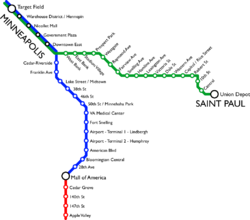METRO (Minnesota)

An eastbound Green Line train just across the Washington Avenue Bridge traveling past the Weisman Art Museum on the University of Minnesota's East Bank
|
|||
| Overview | |||
|---|---|---|---|
| Owner | Metropolitan Council | ||
| Locale | Minneapolis-St. Paul metropolitan area | ||
| Transit type |
Light rail (LRT) Bus rapid transit (BRT) |
||
| Number of lines | 2 LRT lines 2 BRT lines |
||
| Line number |
Blue Line Green Line Red Line |
||
| Number of stations | 41 | ||
| Website | What is METRO? | ||
| Operation | |||
| Began operation | 26 June 2004 | ||
| Operator(s) |
Metro Transit Minnesota Valley Transit Authority |
||
|
|||
Metro (styled as METRO) is a light rail and bus rapid transit system which serves the Minneapolis-St. Paul metropolitan area. As of 2016, the system consists of three lines (Blue, Green and Red) connecting Downtown Minneapolis and St. Paul with Bloomington and Minneapolis-St. Paul International Airport, with several extensions in planning stages. The system is operated by Metro Transit for the Blue and Green, and by the Minnesota Valley Transit Authority for the Red Line.
Metro operates parts of its system 24 hours a day, The entire Green Line and a small 2-station portion of Blue Line which connects the Airport – Terminal 1-Lindbergh and Airport – Terminal 2-Humphrey stations operate 24 hours a day, 7 days a week;
In the 1970s, roughly contemporaneous with the construction of Washington D.C.'s Metro system and San Francisco's Bay Area Rapid Transit, the newly formed Metropolitan Council contemplated the creation of a similar mass transit for the Minneapolis-St. Paul metro area, but the idea was eventually abandoned due to opposition from the Minnesota Legislature. For the next few decades, there were repeated proposals to build light rail along several corridors, particularly the University Avenue corridor between downtown Minneapolis and St. Paul (the present Green Line), but the idea of light rail only gained steam in the late 90s.
...
Wikipedia

